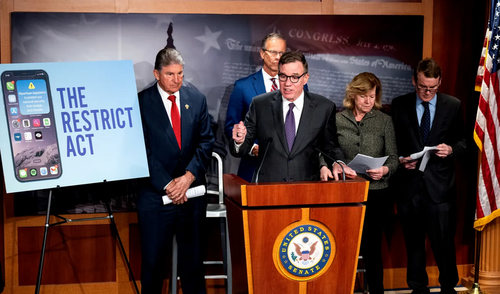 Parler
Parler Gab
Gab
In very specific terms a lot of U.S. websites would be impacted. Why? Because a lot of websites use third-party ‘plug-ins’ or ‘widgets’ or software created in foreign countries to support the content on their site. The “Restrict Act” gives the DNI the ability to tell a website using any “foreign content” or software; that might be engaged in platform communication the U.S Government views as against their interests; to shut down or face a criminal charge. In very direct terms, the passage of SB686 would give the Dept of Commerce, DNI and DHS the ability to shut down what you are reading right now. This is a big deal. -The Last RefugeThe RESTRICT Act can also be used to punish people using Virtual Private Networks (VPNs) if they're used to access banned websites, and directs the Secretary of Commerce to "identify, deter, disrupt, prevent, prohibit, investigate, or otherwise mitigate" that which is deemed a national security risk associated with technology linked to the above countries.

More via Reason:So what happens if you are designated a national security threat? What can they access of yours to confirm it? Everything. Notice the preemptive attack on quantum encryption in there, too. pic.twitter.com/rXMY8v8lOI
— Mises Caucus (@LPMisesCaucus) March 26, 2023
The language describing who the RESTRICT ACT applies to is confusing at best. The commerce secretary would be authorized to take steps to address risks posed by "any covered transaction by any person," right? So what counts as a covered transaction? The bill states that this means "a transaction in which an entity described in subparagraph (B) has any interest." Entities described in subparagraph B are a "foreign adversary; an entity subject to the jurisdiction of, or organized under the laws of, a foreign adversary; and an entity owned, directed, or controlled by" either of these. Foreign adversaries can be "any foreign government or regime" that the secretary deems a national security threat. It's a bit gobbledygooked, but this could be read to imply that "any person" using a VPN to access an app controlled by a "foreign adversary" or its alleged minions is subject to the secretary's ire. Hence anyone using a VPN to access TikTok would be in trouble—specifically, subject to up to $1 million in fines, 20 years in prison, or both.According to Warner's office, however, the provisions only apply when someone is "engaged in 'sabotage or subversion' of communications technology in the U.S., causing 'catastrophic effects' on U.S. critical infrastructure, or 'interfering in, or altering the result' of a federal election in order for criminal penalties to apply," and would target "companies like Kaspersky, Huawei and TikTok … not individual users." Except that the bill specifically says; "no person may cause or aid, abet, counsel, command, induce, procure, permit, or approve the doing of any act prohibited by, or the omission of any act required by any regulation, order, direction, mitigation measure, prohibition, or other authorization or directive issued under, this Act." So that was bullshit. Tucker Carlson had a great recent segment on this featuring Glenn Greenwald. Here are the Republicans supporting the RESTRICT Act.
- Sen. Thune, John [R-SD]
- Sen. Fischer, Deb [R-NE]
- Sen. Moran, Jerry [R-KS]
- Sen. Sullivan, Dan [R-AK]
- Sen. Collins, Susan M. [R-ME]
- Sen. Romney, Mitt [R-UT]
- Sen. Capito, Shelley Moore [R-WV]
- Sen. Cramer, Kevin [R-ND]
- Sen. Grassley, Chuck [R-IA]
- Sen. Tillis, Thomas [R-NC]
- Sen. Graham, Lindsey [R-SC]
British supermarket encloses BUTTER in security netting as UK food inflation persists
By Ramon Tomey // Share
ChiComs have infiltrated Canada’s federal government for 30 YEARS, reveals retired spy
By Kevin Hughes // Share
CBDC will be used for ‘control,’ ECB president admits in vid chat with fake Zelensky
By News Editors // Share
Governments continue to obscure COVID-19 vaccine data amid rising concerns over excess deaths
By patricklewis // Share
Tech giant Microsoft backs EXTINCTION with its support of carbon capture programs
By ramontomeydw // Share
Germany to resume arms exports to Israel despite repeated ceasefire violations
By isabelle // Share










